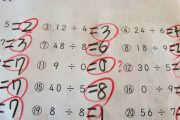In an article about the Chubu Economic Federation’s new initiative to encourage educational reform, Asahi News presented a simple math test that only 40% of new hires at a major Japanese company were able to answer correctly. Netizen reactions to this article were threefold: while many were quick to scorn the test takers, other 2ch commenters weren’t able to solve the problem correctly themselves, and still others pointed out that most of the confusion was a result of the ambiguous way the question was written.
What do you think – is this trending article an indication that fundamental math and reasoning skills have declined on a national level, or was the test biased to begin with? Can you solve this problem on your first try? No peeking…
From Asahi News:
“9-3÷1/3+1=? 40% of New Employees Answer Correctly”
What’s the answer to ”9-3÷1/3+1” (where 1/3 represents one third)? At a major car parts manufacturing company, when newly hired engineers who are high school and college graduates took this test, only 40% answered correctly. A proposal from the Chubu Economic Federation announced on February 3 regarding the competitive power of the manufacturing industry included these results as an example of declining ability.
This large parts manufacturing company conducts the same arithmetic test every year, and in the rate of correct answers in the 1980s was 90%.
Aside from a decline in fundamental academic ability, a survey given by the Chubu Economic Federation to its member companies also revealed that the difference between the abilities companies seek from students and the actual abilities of students is increasing. According to the survey, the top ability valued by 87% of companies when hiring new employees is “communication.” At the same time, the majority of companies (59%) reported sensing a decline in students’ communication abilities.
Because of this sort of gap, especially in smaller companies, cases of young employees losing their jobs are increasing. After this, the Chubu Economic Federation will seek reforms from the nation and educational institutions in order to accomplish goals such as “aiming to replenish the primary education which has been weakened by pressure-free education” and “cultivating communication ability through the use of debate in the classroom.”
(The answer to the test is 1.)
Comments from 2ch.net:
名無しさん@13周年:
9
名無しさん@13周年:
1.5
名無しさん@13周年:
1!
名無しさん@13周年:
Isn’t it 1?
名無しさん@13周年:
Huh? It’s 1, right?
名無しさん@13周年:
Don’t mix up “÷” and “/” !
名無しさん@13周年:
It’s 7. Common sense.
名無しさん@13周年:
Isn’t engineering science?
名無しさん@13周年:
Do the big companies really ask this kind of question?
名無しさん@13周年:
How about 19?
名無しさん@13周年:
Isn’t it 9?
名無しさん@13周年:
It’s 1. I haven’t taken math since middle school and only study the humanities, and even I understand this.
名無しさん@13周年:
The correct answer is 1, but… This is a rude question to ask college graduates.
名無しさん@13周年:
”engineers who are high school and college graduates” what? Under no circumstances is this possible. You would expect every employee to get this right. What happened???????
名無しさん@13周年:
You’re all stupid. It’s definitely 9.
名無しさん@13周年:
The answer is 9. The fact that even here everyone’s answering 1 shows that it’s a bad question. It seem to be a language problem rather than a math one.
名無しさん@13周年:
9―3÷1/3+1
=9-3×3+1
=9-9+1
=1
名無しさん@13周年:
9-3÷1/3+1
=9-3/3+1
=9-1+1
=9It’s 9.
名無しさん@13周年:
Doesn’t 1/3 mean 1÷3?
名無しさん@13周年:
1/3, what is that? If it means one third then the person who wrote it is an idiot.








